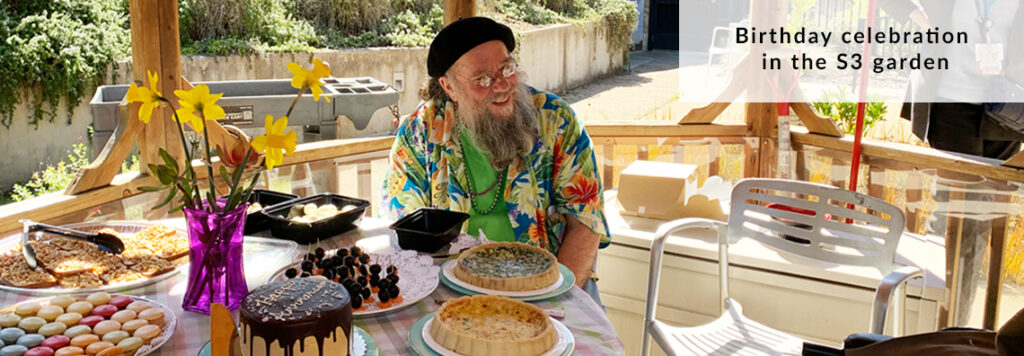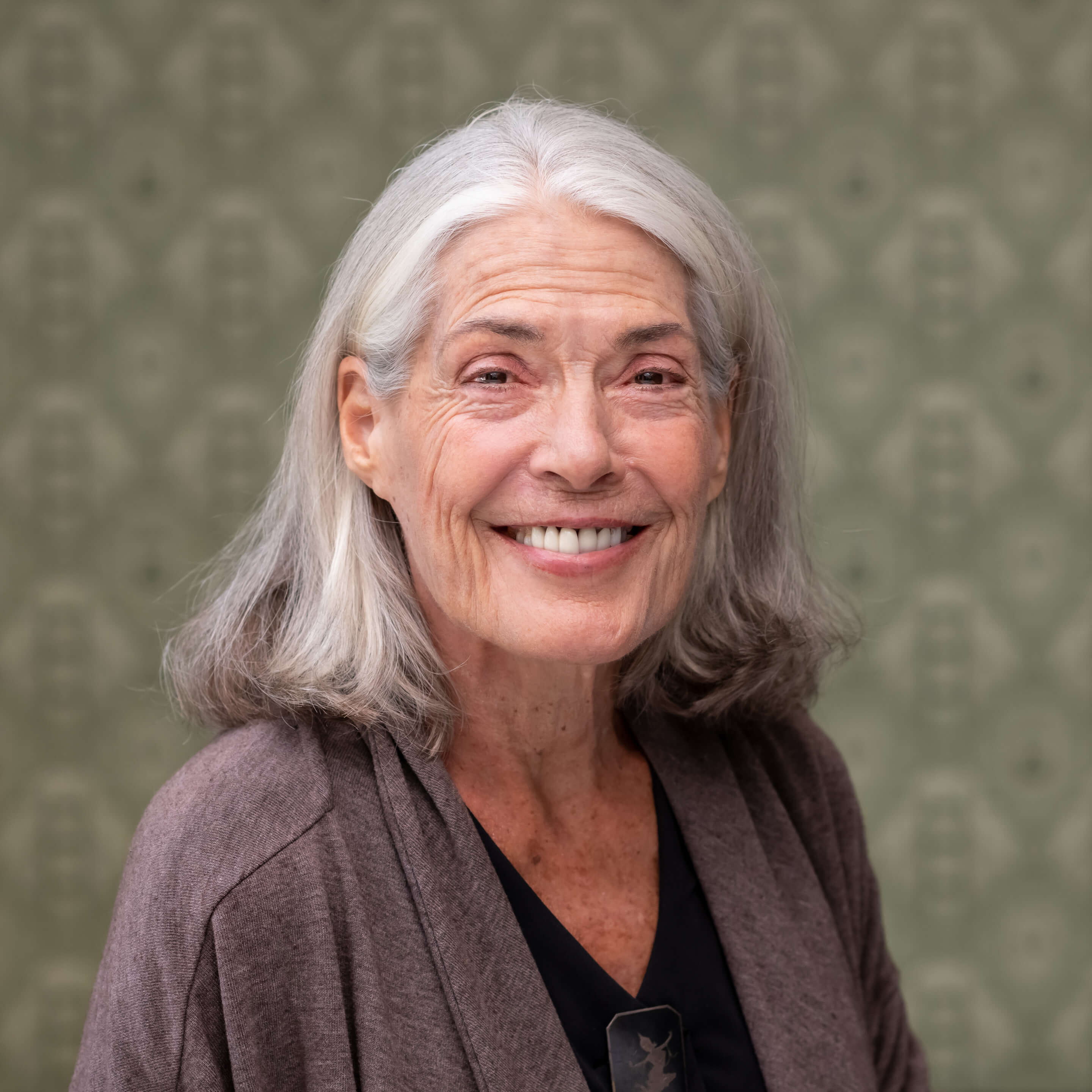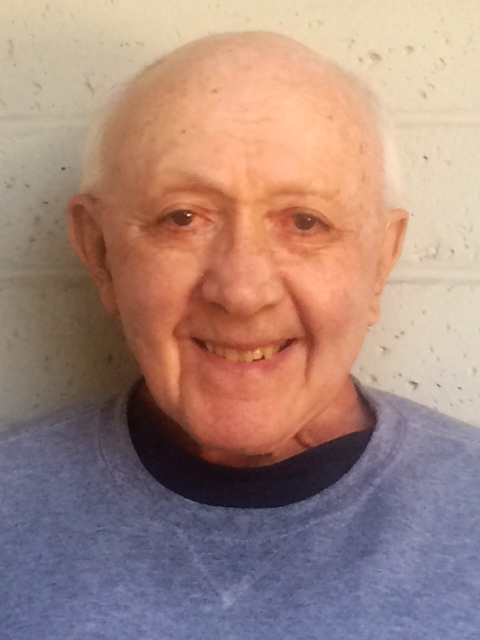Laguna Honda Hospital
Companionship and Compassion: The benefits of ZCP Volunteers on a palliative care ward
Camille Tacderan is the Daytime Charge Nurse on the South Three (S3) Palliative Care Ward at Laguna Honda Hospital, where ZCP volunteers have served for over 30 years. We spoke to Camille about the value the Volunteer Program brings, her experience of working through the pandemic, and her excitement about the Volunteer Program starting up again.
You have spent many years on the ward with the volunteers. What impact do you see them having?
Residents really benefit from having volunteers on the ward to interact with. It can be as simple as them sitting and talking with a resident in the Great Room [the communal area of the ward], or for some residents who are non-verbal just being present with them or holding their hand. Also, the volunteers are on the ward weekly and often have regular visits with residents whose conditions are changing over time, so they build a relationship with them and can tailor their interaction to that resident’s current needs.
They also support the families of residents. What is special about S3 is that it allows family members to be family members. They don’t have to be medical caregivers and instead can live their own lives and visit as sons and daughters, or spouses. The volunteers are a big part of that specialness because families know that even if they can’t be there to sit with their friends or relatives, the volunteers can be. And that is really reassuring.

For staff, more than anything else, it is just knowing that there is someone to sit with a resident when they aren’t available to do so. As staff, we are looking after a number of patients and sometimes can’t sit with people as long as we would like. Especially when that person is approaching the end of their life, it is comforting to know that the volunteers are available to be with that person in their last moments.
“It is comforting to know that the volunteers are available to be with that person in their last moments.”
You worked through the pandemic when volunteers weren’t able to visit the ward in person. How was that experience for you?
The pandemic was really challenging. On a personal level, there was a lot of anxiety around safety for yourself, your family, the residents, and the other staff on the ward.
The ward closed to visitors and volunteers early in March 2019 to protect residents and stayed closed until mid-2021. During this time a lot of residents didn’t understand what happened, some didn’t recognize staff with masks on, and some clearly missed the interaction they had with volunteers and family. For staff, it was also very difficult as we were busy adapting to new protocols and keeping residents safe, and it was at this time, when we were busier than ever, that it would have been wonderful to have the support of the volunteers who could also be with the residents.
The volunteers have started to come back in person to the ward. How do you feel about that?
I’m really excited as the volunteers are such a big help. We are getting more younger residents joining the ward, who are alert and will be in the ward for a long time so have a big need for social interaction from those around them. With our workload, the staff can’t always provide that level of interaction, which is where the volunteers come in.
Some of these younger residents come to the ward having experienced a lot of social isolation. Some have been living in COVID hotels, experiencing a lack of contact and services. Some have been living alone at home or in an SRO. It is so nice to know that they can get the companionship and interaction they want, need, and deserve when they get to the ward, thanks in a big part to the volunteers.
As the hospital is run by the San Francisco Public Health Department, we are the safety net of the city. Our residents may have been living outdoors on the streets with no family or connections and it is lovely to know that they can come to this ward and spend the last few days, months, or years of their life being cared for and that they knew there were people around them who did care about them.
“What we do on the ward is give the residents love.”
What we do on the ward is give the residents love. They are warm, get three hot meals a day, and get taken care of physically and emotionally. Volunteers are a crucial part of this as they fill the gaps when the staff can’t be there. And that is what makes the ward such a special place.
If you like what you read, please join us and enroll in one of our courses, share our work with someone you think will benefit from it, or support us through a donation.
Thank you, Irene!

It is with great sadness that we share the news of the death of our teacher, friend, and colleague, Irene Smith. Irene died at home on April 4th, supported by a wide network of devoted friends and volunteers. Her wish was to remain in her Cole Valley apartment of 42 years until the end, and we accomplished that goal.
Irene participated in the first-ever Zen Hospice Project volunteer caregiver training over thirty years ago and joined us for nearly every one since. She generously shared her Touch Awareness practices later with family and professional caregivers as a Guest Instructor in our Mindful Caregiving Education courses. Irene reached a level of extraordinary renown worldwide for her work under the banner of her educational organization, Everflowing.
We will dearly miss Irene’s care, brilliance, gentle gaze, and good humor. You can find out more about memorial services by visiting her Caringbridge page.
Thank you for your service, dear Irene. May you rest in eternal peace
Learnings from 11 years at the bedside
John Rubin was a volunteer with Zen Caregiving Project for 11 years, serving at the bedside in the palliative care ward at Laguna Honda Hospital. He ended his volunteer service in 2020. Here he shares his story, and what he learned over his many volunteer shifts.
“In 2009, I was 72 and had just retired from a long career in business. I was looking for an activity that was different from my previous work and helped others. The Volunteer Program at Zen Hospice Project, as it was then known, seemed the perfect fit. Every Tuesday morning for the next 11 years, I would make my way to Laguna Honda Hospital to visit the residents (patients) of the Palliative Care Ward, never knowing what the morning would bring.

My 11 years with Zen Caregiving Project (ZCP) were rich and wonderful. The many residents I got to know were people I would never have met elsewhere in my life. What a gift to share time each week with them, the hard-working ward nurses, CNAs, and staff, and my many great ZCP shift mates. And so I wanted to share a few things that I learned from the experience, for current volunteers, anyone considering joining or actually, everybody! The experiences on the ward are just a microcosm of our experiences in our wider lives filled with connection, joy, loss and love.
- Bring your whole self to what you do
Volunteering with ZCP is about bringing your whole self to the residents, and leading with an open heart. My best moments volunteering came when I was totally focused on a resident. For example pushing a lady’s wheelchair back to the ward after a morning Baptist church service, while together humming and singing Amazing Grace. In that moment I knew “this is why I’m here today.” It helped me see that I can bring my whole self to whatever I am doing in life, focusing on the “here and now”.
- Drop expectations
Just like in life, it was best not to come to a volunteer shift with a lot of expectations of what you want to have happen, and avoid giving yourself a grade afterwards about how things actually turned out. You learn to just let the day play out, and deal with whatever comes up.
- We have to accept change
I learned a lot about impermanence. No shifts are ever the same. Patients who you get to know well, like to spend time with, and grow to love are going to die. It’s a world of constant flux and change. Everything changes.
- Listen
Our role as a volunteer is to Be With people rather than trying to Fix things that are out of our control. Our value as volunteers comes in just being with people and listening deeply to them. The stories patients share with you are what they want and need to say. Whether they’re true or not, doesn’t matter. What matters is that they are being heard.
- Be yourself
You are unique, and you will do things differently from others. In volunteering, we all had our different approaches – different but no better or worse. Just be yourself and bring energy, warmth, and loving-kindness to everyone you interact with.
- We are all in this together
We’re all in this life together. It’s good to realize that we may be the one in the bed at some future time with someone else being our caretaker. What would we want then?
The ZCP Volunteer Program is currently continuing remotely, with residents speaking with volunteers by iPads.
To read more please see our blog from a volunteer on her experience of connecting virtually and another on how the volunteer experience has helped during the pandemic.

